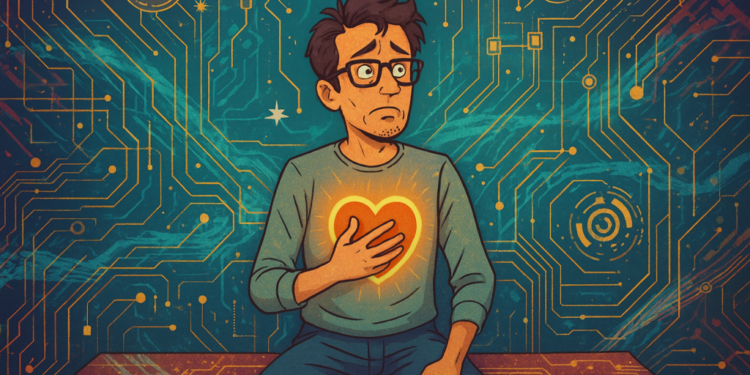
“AI unintentionally made me consider within the idea of a human soul by exhibiting me what artwork appears like with out it.” ~Unknown
What’s intelligence?
I’ve requested this query all my life—as a instructor, a filmmaker, a researcher, and now, as somebody shedding my imaginative and prescient to macular degeneration.
I ask it after I watch college students discover their voice.
I ask it after I hearken to an in depth pal of mine, a world-renowned cosmologist, whose data appears limitless however whose humility runs even deeper. He can talk about black holes one minute and quote the Tao Te Ching the following. He doesn’t simply know info—he is aware of the best way to hear. He is aware of the best way to clarify one thing sophisticated with out making you’re feeling small. That, to me, is actual intelligence.
And but… I’ve began to note one thing unusual.
Synthetic Intelligence is starting to resemble individuals like him. It will possibly write fluent sentences. It will possibly summarize books I haven’t learn. Typically, it surprises me. And I discover myself questioning: is this additionally intelligence?
What AI Will get Proper—and What It Will By no means Really feel
Let me say this clearly: I’m grateful for AI. This very essay was formed with its assist. I’ve superior macular degeneration. Proofreading my very own writing is troublesome—generally unimaginable. Instruments like this are usually not a luxurious for me. They’re a present. A lifeline. With out them, I wouldn’t be capable of preserve writing. For that, I’m grateful.
However there’s a sort of intelligence that AI won’t ever know.
It received’t really feel the panic of forgetting your strains onstage, or the push of remembering them mid-breath. It doesn’t lie awake at night time questioning whether or not your work issues. It doesn’t weep when your mom now not remembers your identify. It doesn’t get nervous earlier than a job interview. It hasn’t failed, or recovered, or liked.
It will possibly assist categorical a sense, but it surely can not have one.
A Software, not a Thoughts
We name it “synthetic intelligence,” but it surely’s extra like synthetic fluency. It’s quick. It’s competent. It will possibly impress you. However it doesn’t know in the best way we all know. It hasn’t spent years practising an instrument at nighttime or educating a pupil who doesn’t consider in themselves—till at some point, they do. It doesn’t develop from expertise.
It doesn’t grieve. It doesn’t heal. It doesn’t change.
So when individuals say, “AI goes to switch us,” I at all times surprise—which a part of us? The half that fills out varieties and writes reviews or does different rutinary duties? Perhaps. However the half that authentically and actually tells a narrative nobody else can inform? By no means.
Educating College students to Present Up
In each class I’ve taught, I’ve mentioned some model of this:
“Don’t cease on the analysis. Don’t cease at what AI provides you. Study to point out up in your work.”
Some college students cover behind info. It’s safer. However I inform them: you are the that means. You’re the perception. You’re the danger.
I as soon as had a pupil who wrote a technically flawless paper. However it had no voice. After I requested her what it meant to her, she hesitated. Then she advised me about her father, who had lived by way of the conflict the paper was about. Her total relationship to the subject shifted in that second. That was the true intelligence. Not the citations. Not the syntax. The braveness to talk from the guts.
When Sight Fades, One thing Else Comes into View
Dropping your imaginative and prescient isn’t just about studying much less. It’s about seeing in another way. It’s about slowing down. Listening extra. Studying to belief what you possibly can’t confirm together with your eyes.
It has additionally deepened my appreciation for instruments like AI. I depend on them day by day. However I additionally discover their limits. They assist with kind, however not with essence. They clear the window, however they will’t present you what’s outdoors. That also requires you.
Intelligence Is Not the Similar as Knowledge
My sensible cosmologist pal as soon as advised me, “The extra I study, the extra I notice how little I perceive.”
AI doesn’t say issues like that.
It doesn’t know humility. Or thriller. Or awe.
Intelligence, within the deepest sense, just isn’t about management or solutions. It’s about how we feature ourselves in uncertainty. It’s about grace underneath strain. Presence in ache. Humor in despair. Kindness with out reward. None of that reveals up in a immediate.
The Closing Lesson: Instruments Don’t Substitute Soul
If there’s one factor I’ve realized—by way of educating, by way of imaginative and prescient loss, by way of utilizing AI—it’s this:
A software will help you construct one thing. However it might’t let you know why it issues.
So sure, use the instruments. Use AI. Let it help you. I do.
However always remember: you might be greater than the software. You’re the story behind the sentence. The silence between the notes. The rationale the work issues in any respect.
That’s not synthetic. That’s actual.
And it’s irreplaceable.
About Tony Collins
Tony Collins is a documentary filmmaker, educator, and author whose work explores creativity, caregiving, and private progress. He’s the creator of: Home windows to the Sea—a transferring assortment of essays on love, loss, and presence. Artistic Scholarship—a information for educators and artists rethinking how artistic work is valued. Tony writes to mirror on what issues—and to assist others really feel much less alone.








Discussion about this post